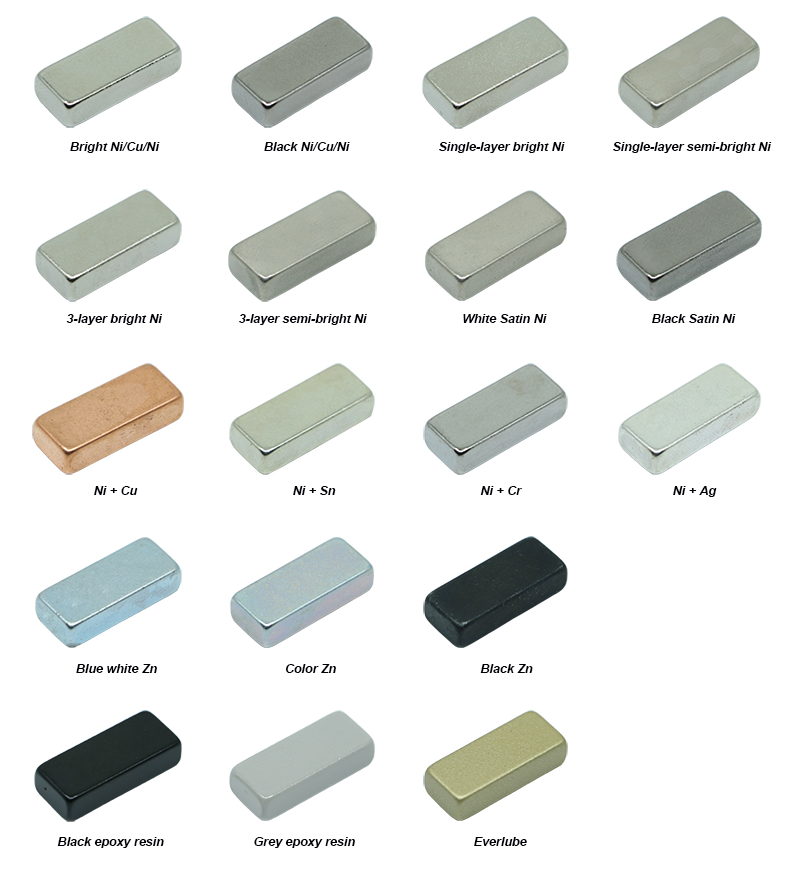
Privacy statement: Your privacy is very important to Us. Our company promises not to disclose your personal information to any external company with out your explicit permission.
Magnet coating is very important protection for Neodymium Magnet. Surface treatment is a process applied to the surface of a material to make it better in some way, for example by making it more resistant to corrosion or wear.
Corrosion can cause unprotected magnets to spall off a surface layer, or to crumble into a powder. Use of protective surface treatments such as gold, nickel, zinc, and tin plating and epoxy resin coating can provide corrosion protection.
Coating makes brittle Permanent Magnet more durable; multilayered metal plating like NiCuNi will improve the magnets resistance to chipping and wear, particularly around corners.
Harsh environments like salt and humidity in regions near the ocean can`t be ignored while choosing a coating.

(Coating of Sintered Neodymium Magnets)
The most common type of plating Nickel (Ni-Cu-Ni) is mainly for conventional environment and has proven to be very resilient when subjected to normal wear and tear. However it will be corroded in prolonged exposure to salt water, salty air, or harsh chemicals.
Everlube is a new coating appearing in recent years which will provide excellent resistance to heat and viscous properties and can be used on auto parts.
If coating can`t help, low weight loss magnet (hast magnet) is also a good solution.
No. Only rare earth magnet which is extremely brittle and also vulnerable to corrosion, is usually plated or coated to protect it from breaking, chipping, or crumbling into powder.Permanent Ferrite Magnet usually don't require coating.
There are two types of rare earth magnets: neodymium magnet and samarium–cobalt magnet. The former is more vulnerable to oxidation than the latter.
Basically, there are five kinds of surface treatment that can be applied to permanent magnets.
To make cathode electrophoresis by chemical principle, it is a common surface treatment process in the world currently.
a. salt spray test for 48 hours
b. constant temperature and humidity for 240 hours
c. good oil resistance and solvent resistance.
d. smooth surface, beautiful appearance
To coat with a layer of anti-rust oil film evenly on the surface of product by the impregnation method. It can improve anti-rust capability without change of the appearance and size of product. It is particularly suitable for small-bore product
a. efficiency
b. simple process
To spray anti-corrosion coating evenly on the surface of product by spray principle. It`s especially used on small product with the weight less than 1 gram, or the outer diameter less than 5mm.
a. salt spray test for 24 hours
b. constant temperature and humidity for 240 hours
c. efficiency & high pass rate
d. good consistency
The most corrosion resistant, thicker than other plating, mold required to create the plastic shell.
To permeate special glue into the gaps of product by negative pressure method. It is suitable for products which work in the oil or solvent environment.
a. seal porous surfaces
b. increase product strength
c. work long time in the oil or solvent environment
LET'S GET IN TOUCH

Privacy statement: Your privacy is very important to Us. Our company promises not to disclose your personal information to any external company with out your explicit permission.

Fill in more information so that we can get in touch with you faster
Privacy statement: Your privacy is very important to Us. Our company promises not to disclose your personal information to any external company with out your explicit permission.